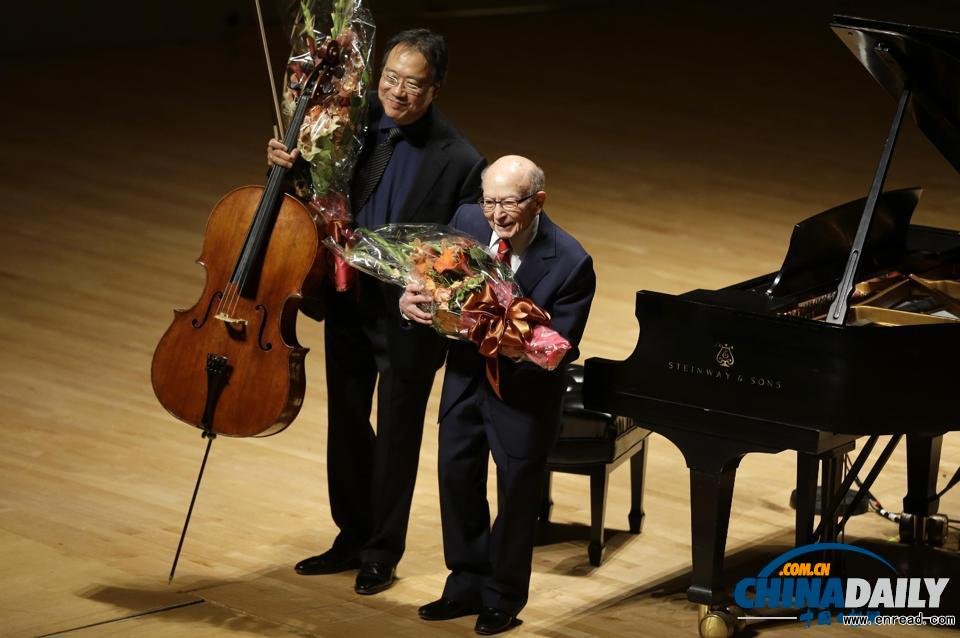一名90岁的纳粹大屠杀幸存者当天在波士顿交响乐大厅和华裔大提琴家马友友同台演出,给特雷津音乐基金会筹集资金,该音乐会一直致力于保护在大屠杀中遇难的艺术家和音乐家的作品。
Ma and George Horner, a
retired9 doctor who lives near Philadelphia, embraced warmly in a small room at Boston's Symphony Hall on Tuesday afternoon before a brief
rehearsal10.
Ma thanked Horner for
helping11 the Terezin Music Foundation, named for the town of Terezin, site of an unusual Jewish
ghetto12(贫民区) in what was then German-occupied Czechoslovakia. Even amid death and hard
labor13,
Nazi7 soldiers there allowed prisoners to stage performances.
On Tuesday night, they will play music composed 70 years ago when Horner was
incarcerated14(监禁).
"It's an extraordinary link to the past," said concert organizer Mark Ludwig, who leads the foundation.
Horner played piano and
accordion15 in the Terezin cabarets, including
tunes16 written by fellow
inmate17 Karel Svenk. On Tuesday, Horner will play two of Svenk's works solo - a march and a
lullaby(摇篮曲) - and then team up with Ma for a third piece called "How Come the Black Man Sits in the Back of the Bus?"
Svenk did not survive the genocide. But his musical
legacy18 has, due in part to a chance meeting of Ludwig, a scholar of Terezin composers, and Horner, who never forgot the songs that were written and played in
captivity19.
Still, Ludwig found it hard to ask Horner to perform pieces
laden20 with such difficult memories.
"To ask somebody who ... played this in the camps, that's asking a lot," said Ludwig.
Yet Horner readily agreed to what he described as a "noble" mission. It didn't hurt that he would be sharing the stage with Ma - even if he thought Ludwig was joking at first.
"I told him, 'Do you want me to swallow that one?'" Horner recalled with a laugh. "I couldn't believe it because it's a fantastic thing for me."
Ma said before the performance that he hoped it will inspire people to a better future.
"I grew up with the words, 'never again,'" said Ma, who was born 10 years after the end of World War II revealed the scope of the Holocaust. "It is kind of inconceivable that there are people who say the Holocaust didn't exist. George Horner is a living contradiction of what those people are saying."
He said Horner was able to survive "because he had music, because he had friends, because the power of music could fill in the empty spaces."
"To me George Horner is a huge hero, and is a huge inspiration," Ma said. "He is a witness to a window, and to a slice of history, that we never want to see again, and yet we keep seeing versions of that all over the world. I hope we are inspired by that and we keep that memory forever."
The program features additional performances by Ma and the Hawthorne String Quartet. In a statement, Ma said he's glad the foundation is "giving voice through music to those whose voices have been
tragically21 silenced."
Horner was 21 when he was freed by
Allied22 soldiers in 1945 after serving time at Terezin, Auschwitz and Buchenwald. His parents and sister perished in the camps.
And though his back still bears the scars of a Nazi beating, he
remains23 spry and seems much younger than his 90 years.
When Horner found out about the duet(二重奏) with Ma, Ludwig said, "He was so excited, to me he sounded like a teenager."

 收听单词发音
收听单词发音 


